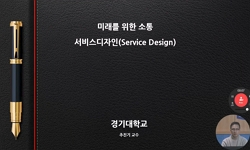Virtual reality-based non-face-to-face content is rapidly evolving, in particular, its application in the field of virtual human is increasing due to the development of artificial intelligence. On the other hand, Generation Z, who directly affected by...
http://chineseinput.net/에서 pinyin(병음)방식으로 중국어를 변환할 수 있습니다.
변환된 중국어를 복사하여 사용하시면 됩니다.
- 中文 을 입력하시려면 zhongwen을 입력하시고 space를누르시면됩니다.
- 北京 을 입력하시려면 beijing을 입력하시고 space를 누르시면 됩니다.

시나리오 플래닝 방법론을 활용한 맞춤형 버추얼 휴먼 미래 서비스 시나리오 제안 -Z세대의 정서적 교류 측면을 중심으로- = Proposal for Personalized Virtual Human Service Scenarios Based on Scenario Planning Methodology -Focusing on Emotional Engagement of Gen Z-
한글로보기https://www.riss.kr/link?id=A108534023
- 저자
- 발행기관
- 학술지명
- 권호사항
-
발행연도
2023
-
작성언어
Korean
- 주제어
-
등재정보
KCI등재
-
자료형태
학술저널
-
수록면
35-54(20쪽)
- 제공처
-
0
상세조회 -
0
다운로드
부가정보
다국어 초록 (Multilingual Abstract)
Therefore, this study propose a personalized virtual human service scenario based on emotional engagement that can resolve social isolation for Generation Z who want emotional engagement in the untact era.
Future scenario development was implemented using scenario planning methodology, and the future service of virtual human was concretized using a double diamond process of service design.
As a result of the study a ‘personalized virtual human service U’ was developed that considers future technologies and environments. First, as a core function of the service, advanced personalized service was presented by setting virtual human through algorithm linkage and updating user behavior analysis. Second, by applying virtual reality technology that enhances the sense of reality vividly, it enabled users with closer intimacy and high accessibility to services. Third, reliable services were established by cooperate psychiatrists and a big data specialized institution, and through a crisis response team in preparation for mental health and security emergencies.
By applying the scenario planning methodology to the existing service design process to review various scenarios for the uncertain future and, this leads the study serves academic purposes in that proposing a service by analyzing the current context and future prospects. In addition, this study serves future scenario reflecting the needs of Generation Z, who became the subject of the future economy and future rule of virtual humans. It is expected that this can be used in service and policy planning to resolve the sense of social isolation of Generation Z in the future, leading to practical and policy significance.
Virtual reality-based non-face-to-face content is rapidly evolving, in particular, its application in the field of virtual human is increasing due to the development of artificial intelligence. On the other hand, Generation Z, who directly affected by COVID-19, is having a lot of difficulties in forming interpersonal relationships and emotional communication as a result of social disconnection.
Therefore, this study propose a personalized virtual human service scenario based on emotional engagement that can resolve social isolation for Generation Z who want emotional engagement in the untact era.
Future scenario development was implemented using scenario planning methodology, and the future service of virtual human was concretized using a double diamond process of service design.
As a result of the study a ‘personalized virtual human service U’ was developed that considers future technologies and environments. First, as a core function of the service, advanced personalized service was presented by setting virtual human through algorithm linkage and updating user behavior analysis. Second, by applying virtual reality technology that enhances the sense of reality vividly, it enabled users with closer intimacy and high accessibility to services. Third, reliable services were established by cooperate psychiatrists and a big data specialized institution, and through a crisis response team in preparation for mental health and security emergencies.
By applying the scenario planning methodology to the existing service design process to review various scenarios for the uncertain future and, this leads the study serves academic purposes in that proposing a service by analyzing the current context and future prospects. In addition, this study serves future scenario reflecting the needs of Generation Z, who became the subject of the future economy and future rule of virtual humans. It is expected that this can be used in service and policy planning to resolve the sense of social isolation of Generation Z in the future, leading to practical and policy significance.
동일학술지(권/호) 다른 논문
-
카노모델 기반 대학생 모바일 정신건강관리 서비스 품질 평가
- 한국디자인문화학회
- 김경연
- 2023
- KCI등재
-
- 한국디자인문화학회
- 김소혜
- 2023
- KCI등재
-
가상 인풀루언서의 실재감과 애착이 콘텐츠 이용만족에 미치는 영향 -불편감을 매개변인으로-
- 한국디자인문화학회
- 김종무
- 2023
- KCI등재
-
지경(地景)건축 조형의 미의식에 관한 연구 -진화미학과 신경과학을 중심으로-
- 한국디자인문화학회
- 대 우 항
- 2023
- KCI등재




 DBpia
DBpia


